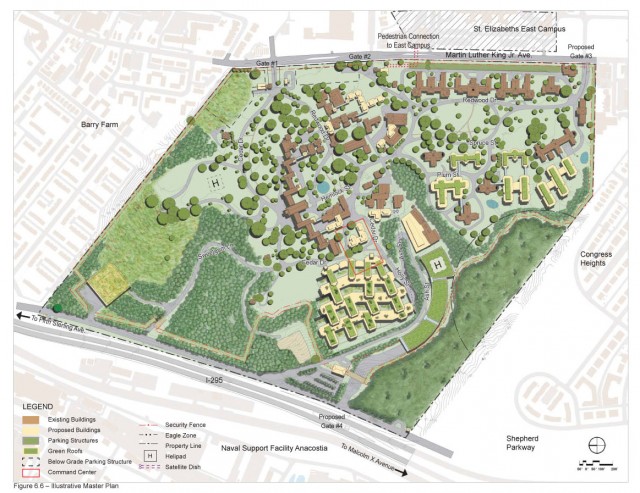 St. Elizabeths Hospital, perhaps best known as the psychiatric facility in which the poet Ezra Pound was held for thirteen years after having been convicted of treason, and where would-be presidential assassin John Hinckley has been confined since June 1982, is choice real estate. Occupying more than 180 acres of federal property with a sweeping view of the Capitol, the Tidal Basin, National Airport, and other Washington landmarks, it lies squarely in the path of the District’s eastern development expansion.
St. Elizabeths Hospital, perhaps best known as the psychiatric facility in which the poet Ezra Pound was held for thirteen years after having been convicted of treason, and where would-be presidential assassin John Hinckley has been confined since June 1982, is choice real estate. Occupying more than 180 acres of federal property with a sweeping view of the Capitol, the Tidal Basin, National Airport, and other Washington landmarks, it lies squarely in the path of the District’s eastern development expansion.
After serving for more than a century to the treatment of troubled psyches, much of the campus is disused and in disrepair. After having been deemed “endangered” by the National Trust for Historic Preservation, the site has been slated for more than a decade as the future consolidated headquarters of the Department of Homeland Security, an omnibus agency that itself consolidated 22 smaller agencies in the wake of the terrorist attacks of September 11, 2001. The headquarters consolidation effort would entail significant renovation, rebuilding, and new construction, and it is one of the most complex and costly building projects in in the works in Washington, DC.
A report recently issued by the U.S. Senate Committee on Homeland Security and Governmental Affairs notes that DHS is now scattered across more than 50 facilities in Washington, Maryland, and Virginia, “many of which are physically inadequate.” Its authors add that this dispersal makes it difficult for DHS to act in a cohesive, collaborative manner—the very rationale for establishing the department so that diverse law enforcement and national intelligence functions could be brought under one roof to foster what former Secretary Michael Chertoff called a “one-DHS culture.”
When the master plan for the renovation of St. Elizabeths was effected in 2009, the total cost was estimated to be $3.4 billion, with a projected move-in date of 2016. That cost has risen to $4.5 billion, the Washington Post reports, and the move-in date, already far behind schedule, is now projected to stretch into 2026—ten years late—if funding trends hold.
That delay is puzzling, given that DHS has long cited headquarters consolidation as a pressing national security need. But for the time being, only one DHS unit, the U.S. Coast Guard headquarters, has taken up residence on the campus.
Meanwhile, the Senate Committee report continues, that pressing need for consolidation remains unaddressed, at least in part because Congress has consistently allocated less funding than requested—$1.2 billion less, in fact, since 2006. This shortfall has led to construction delays and increased costs of various kinds.
The authors observe that in a time of constantly shrinking budgets and economic instability, the temptation exists to shelve “long-term investments that have yet to bear fruit.” They add, though, that conversely, consolidation stands to save millions in taxpayer dollars in the long term through realized efficiencies. Indeed, the authors claim, the savings over the next 30 years could reach a billion dollars: $700 million in saved rent, $210 million in housing more employees in more efficiently designed, morale-boosting new space, and $132 million in the saved cost of having to maintain St. Elizabeths as a historic property.
For that and other reasons, the report recommends that the St. Elizabeths DHS consolidation project be considered a funding priority. The authors urge that the 2015 request of $323 million for renovation of St. Elizabeths be funded. They add that if the allocation is not made, the $348 million that has already been spent will go to waste. At the same time, they note that a revised plan is required to be sure that the project is “well managed and implemented.”
The report also emphasizes the Government Accountability Office’s insistence that property ownership is far less expensive than leasing property to house federal agencies, a stance that has obvious implications for our readership. “Delays in construction at St. Elizabeths have required DHS to continue to lease office space throughout the region,” the authors write. “Most of those offices are paid for through increasingly more expensive operating leases, meaning fewer dollars can be spent on mission operations.”
The Office of Management and Budget is now reviewing a draft revision of the DHS consolidation project. Meanwhile, a report from the GAO released on September 19 suggests that the General Services Administration and DHS consider alternatives to St. Elizabeths. It also faults the agencies for poor management of schedules and budgets, calling current estimates unreliable. “Creating reliable cost and schedule estimates for the headquarters consolidation project should be an integral part of DHS and GSA efforts to reassess the project,’’ the report scolds. “Without this information . . . the project risks potential cost overruns, missed deadlines, and performance shortfalls.’’
Congressional Democrats and Republicans, predictably, are divided: Many Republicans are pressing to divert funds from the consolidation to such matters as border security, while many Democrats are urging that the St. Elizabeths project be fully funded and completed.
In short, this unfinished business is business as usual, leaving us to continue our speculation as to whether this project will ever be completed.
